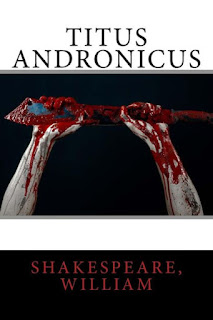Romeo and Juliet by William Shakespeare
Shakespeare 2020 Project
One of Shakespeare's most well-known and most oft performed plays. I find it interesting that Shakespeare's plays are categorized as Histories, Tragedies and Comedies, so his love stories fit into either tragedy or comedy - rather appropriate!
While this is a tragedy play, I found some comedic gems, such as the senior Capulet realizing more time has passed then he thought (as we all do after a certain age!)
Capulet: How long is 't now since last yourself and I
Were in a mask?
Capulets' Cousin: By'r Lady, thirty years.
Capulet: What, man, 'tis not so much
'Tis since the nuptials of Lucentio
...Some five and twenty years, and then we masked.
Capulets' Cousin: 'Tis more, 'tis more. His son is elder, sir.
His son is thirty.
Capulet: Will you tell me that?
His son was but a ward two years ago.
And how bout this knee-slapper:
Mercutio: Thou wilt quarrel with a man for cracking nuts, having no other reason but because thou hast hazel eyes.
Romeo reminded me of the sappy male characters in Nicholas Sparks' novels:
Romeo: See how she leans her cheek upon her hand!
O that I were a glove upon that hand,
That I might touch that cheek!
I think my favorite character was Friar Lawrence as he often said to love-sick, fickle Romeo exactly what I was thinking:
(When Romeo confesses is love for Juliet a mere 12 hours after pining away for his one true love Rosaline)
Friar Lawrence: Holy Saint Francis! What a change is here!
(When Romeo confesses is love for Juliet a mere 12 hours after pining away for his one true love Rosaline)
Friar Lawrence: Holy Saint Francis! What a change is here!
Is Rosaline, that thou didst love so dear,
So soon forsaken? Young men's love, then, lies
Not truly in their hearts, but in their eyes.
Jesu Maria, what a deal of brine
Hath wash'd thy sallow cheeks for Rosaline!
How much salt water thrown away in waste,
To season love, that of it doth not taste!
And when Romeo is writhing on the ground lamenting his reduced sentence:
Romeo: There is no world without Verona walls,
But purgatory, torture, hell itself.
***
Friar Lawrence: O deadly sin! O rude unthankfulness!
Thy fault our law calls death; but the kind Prince,
Taking thy part, hath rush'd aside the law,
And turn'd that black word death to banishment.
This is dear mercy, and thou seest it not.
Romeo does grow up a little and has some poignant lines:
Romeo: O mischief, thou art swift
To enter in the the thoughts of desperate men!
***
***
Romeo: There is thy gold - worse poison to men's souls,...
Of course as we all know, things do not end well for the two young lovers:
Prince: For there never was a story of more woe
Than this of Juliet and her Romeo.


































